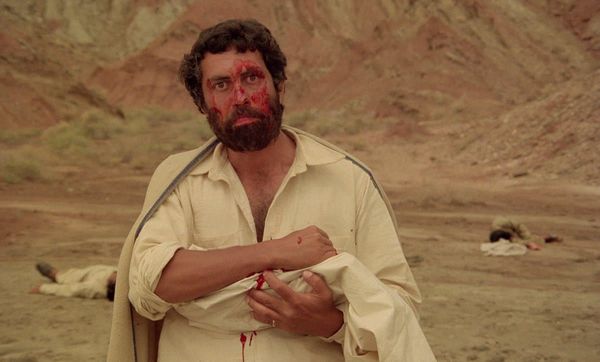Eye For Film >> Movies >> The Blood Of Hussain (1980) Film Review

Summarised as an “abstract essay on tyranny” by its maker, Pakistani director Jami Dehlavi’s The Blood Of Hussain retains a bracing power nearly 40 years after its release. Debuted at Cannes in 1980 but shot three years earlier, the film acquired the status of premonition, appearing to predict the 1977 coup which saw military dictator General Zia ul-Haq replace the country’s democratically elected government. Little wonder then that the film was promptly banned in its homeland.
Though set up as a modern retelling of how Muslim martyr Imam Hussain was killed by Yazid ibn Muawiya after the former refused to recognise him as his leader at the Battle of Karbala in 680, it’s really a radical work of 1970s Third Cinema. Yet while it’s unambiguous in its denouncement of state corruption and oppression, questioning the responsibility of those who wield power, it also works as a mesmeric piece of art cinema.

At its plainest, this is a story of two twins (both played by Salman Peerzada) who have followed opposing paths. Salim is an agent of the regime, educated in the West, carrying himself with a patrician air and looking to further his career. His brother Hussain, though a landowner, lives with the local villagers, even marrying one of his worker’s daughters (though her own happiness at this is hard to tell). When the General launches a coup, Salim strives to remain an asset, but Hussain, who has never forgotten the prophecy revealed to him by an elderly mystic, rejects all trappings of power, even when he is hunted by the army and his workers’ homes are bulldozed. If this sounds like a binary case of good versus evil framed as fratricidal conflict, it’s handled with a sensitive touch, one with a feel for the mythic and mystical. Politics is never far from religion and spiritualism for Dehlavi.
With as much in common with Mohsen Makhmalbaf as the likes of Costa-Gavras, this could have been tooled as an efficient thriller, but with Dehlavi caring less about the what (that this is a story of martyrdom is clear from the offset), you instead watch to see how Hussain’s fate comes to pass. Less about propulsion than righteous intrigue, the narrative can seem sketchily drawn, the pacing bumpy, but the film seduces with its lyricism, visual and musical, whether it’s documentary-style footage of self-flagellation rituals or an unforgettable scene that reveals a white stallion rising out of the sepia earth. Dehlavi’s intuitive gift for symbolic staging – both brutal and beautiful – is evident.
While it remains banned in Pakistan where it has become a piece of cinematic folklore thanks to the noble efforts of bootleggers, The Blood Of Hussain is also little known in the UK, despite Dehlavi working here for much of the 1980s and 1990s. With a new relevance for an era of strongmen rising to power, it makes this BFI release, a startling dovetailing of politics and poetry, a welcome, overdue surprise.
Reviewed on: 30 Oct 2018

















